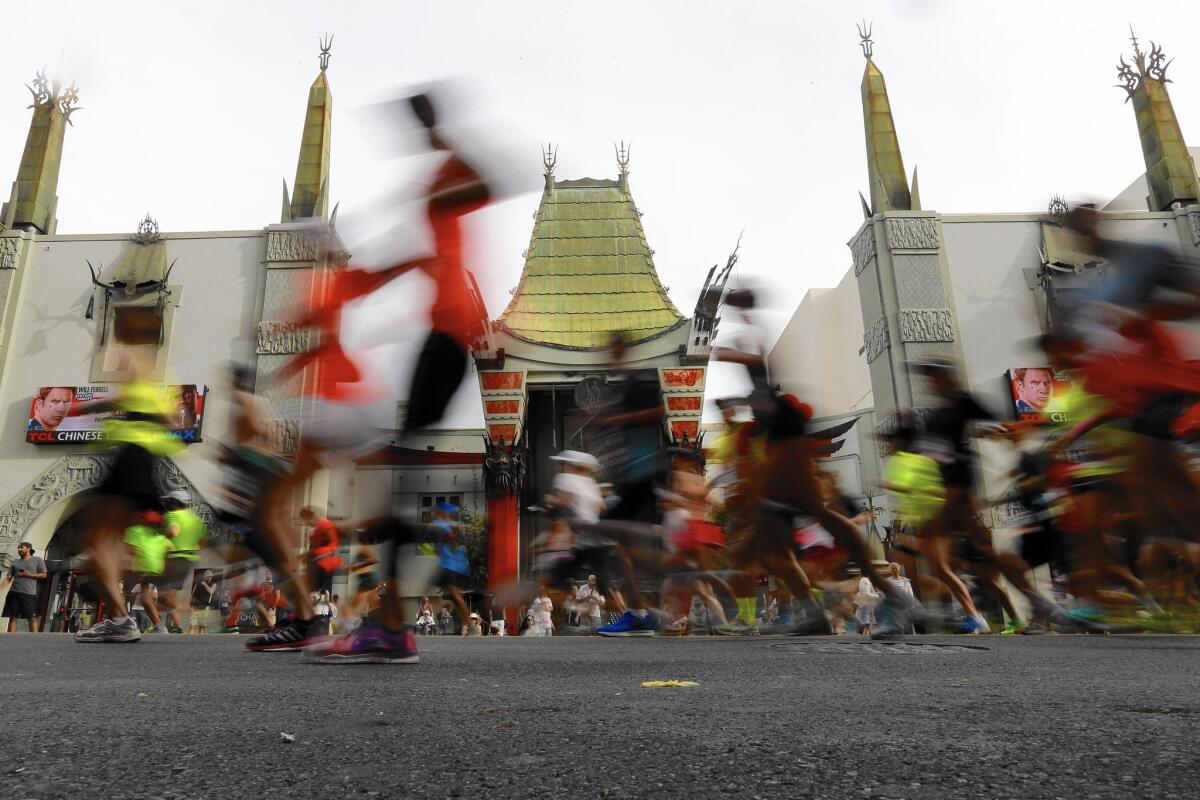26.2 survival tips for the L.A. Marathon

At this point, on the eve of the Los Angeles Marathon, you canât get in better shape. You either trained or you didnât. But you can survive and thrive if you have a strategy to avoid cramping and injury, and take advantage of the peculiarities of Los Angelesâ hilly, attraction-studded âStadium to the Seaâ course.
Here are 26.2 nuggets of advice from three guys who should know: Rod Dixon, the 1983 New York Marathon winner who was the longtime director of coaching and training for the L.A. Marathon and now runs the Rod Dixonâs Kids Marathon Foundation; Santa Monica physical therapist Robert Forster, author of âHealthy Running Step by Step,â who has helped train dozens of Olympic runners and will provide massages and food to hundreds of marathon finishers at his 5th Street and Wilshire Boulevard location; and Steve Mackel, who has coached 400 people to run the marathon through his Sole Runners training clinics.
1. Make time for a Hollywood selfie: âThe L.A. Marathon is not about a [personal record]; itâs about seeing the city,â says Mackel. âAnd no other marathon has the Disney Concert Hall, Hollywood Boulevardâs [TCL] Chinese Theatre and West Hollywood.â
2. Expect to go slower than normal: âStadium to the Sea is a hilly course, a thinking manâs course â not a speed course,â says Dixon.
3. If youâre going for a PR, warm up with at least 20 minutes of stretching, jogging and sprinting before the race, says Forster.
4. Let your fast friends go: Run at your pace, not your buddyâs.
5. Draft a training group that runs at your ideal pace. (Groups are identifiable by a pace leader carrying a sign with the groupâs target finish time.)
MORE: Get our best stories in your Facebook feed >>
6. Donât try to make up for lost time: âIn a marathon, youâre an economy car,â says Dixon. âAccelerate too fast and you burn up too much gasoline.â
7. Thereâs no shame in walk breaks.
8. Eat early to allow for digestion.
9. Carry some salty snacks. âIâd say 90% of the limping, cramped runners with grimacing faces who I see after the race took in little or no salt,â Forster said.
10. Donât overdrink: Too much fluid can cause distress (and time-consuming bathroom breaks).
11. Follow the 10-30-45 Rule, says Mackel: Take a sip of water every 10 minutes (roughly every aid station); nibble something salty every 30 minutes and eat 100 calories every 45 minutes.
12. Keep yourself cool with what Forster calls the âhydro-squat,â a 45-degree, leaning-forward squat, which allows you to dump a cup of water on your face, head and body while keeping your socks and shoes dry.
13. Ban the heel strike. Land on your forefoot with a bent leg and take short steps that land under your body, not ahead of it. This method creates less stress on the body.
14. Keep arms bent at 80 degrees (just under a right angle), and swing them in a vertical plane alongside your body, not sideways across your chest, which wastes energy. You want all motion directed forward.
15. Manage the hills. âLean forward and drive your arms,â says Dixon.
16. If you start to cramp: Slow down, take in more water and something salty âŚ
17. ⌠Stop and stretch for three minutes. âItâll save you 20 minutes,â says Forster.
18. No new shoes: Fresh shoes might look good, but they may rub you the wrong way on race day.
19. Choose a comfortably snug-fitting fanny pack for your smartphone and snacks. (You donât want the pack flopping around.)
20. Donât freeze on race morning. Wear an old sweatshirt you donât need and toss it aside at Mile 3.
21. Donât forget your hat and sunscreen.
22. Men who stay on the course for more than four hours tend to suffer chafed nipples, says Forster, so put Band-Aids over them.
23. Lube up with Vaseline before the race, hitting nooks and crannies that rub.
24. If you train with a heart-rate monitor, set it to beep when your heart rate goes above your aerobic zone. (Itâll keep you from running too fast and burning out.)
25. Designate an emergency contact who will be on standby in case something goes wrong and you need a pickup. And then hope you wonât need the assist.
26. Involve your family, says Dixon: Station your peeps at spots along the course to give you a banana, some jerky, or, best of all, a high-five and a cheer.
And finally âŚ
26.2: Save a little energy so you can run across the finish line with a big smile on your face. (Thatâs when your finisherâs photo will be taken!)






